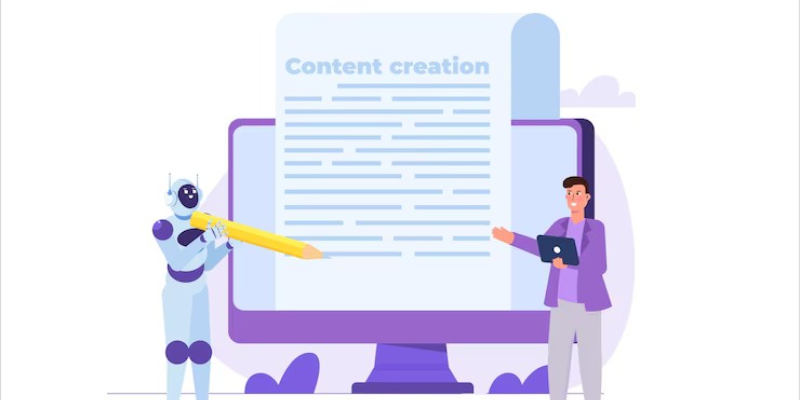

The fast-changing digital marketing landscape is no longer optional as you need to stay ahead of the curve. In the realm of having to be competitive, businesses are required to adopt innovative strategies, and content optimization driven by AI is among the hottest of revolutions. This beginner’s guide goes through how AI tools can help you in content marketing by optimizing the content, helping improve search engine rankings, and powering up your marketing strategy.
Content optimization by artificial intelligence is the act of using artificial intelligence tools and technology to evaluate, improve, and enhance the caliber of digital content. AI is changing how marketers create and optimize content to the audience’s expectations, from SEO strategies to content personalization. Suppose you’re a blogger, an e-commerce business owner, or a marketing professional. In that case, you need to know about AI-driven content optimization and understand how it can impact your results. Whether you’re running an SEO agency in Bangalore or offering content marketing services in Bangalore, these insights are crucial.
The AI tools for content marketing make the process of huge datasets quick, providing actionable insights in seconds.
AI helps you create content that your audience actually cares about by analyzing user behavior and search engine algorithms as well as your competitors.
AI helps you create better content on multiple channels in a consistent manner to reach your target audience.

SEMrush, Ahrefs, and Google’s Keyword Planner are all AI tools that can assess search trends and provide higher traffic-generating keywords. Imagine you google using "Optimize content with AI", this will show you similar terms and their search volume and rank difficulty.
Natural language processing (NLP) tools such as Jasper and Copy.ai can be used to generate content ideas, headlines, and even full articles. It saves you time and you won’t be writing content that nobody wants to read.
Grammarly and Hemingway are just some examples of AI-powered tools that help users write in the best readable, grammatical, and tone words. These upgrades can help your SEO performance.
Tools, of course, include Surfer SEO and Clearscope used for AI SEO strategies, which analyze the relevance of your content and optimize it by AI for search engine algorithms. They identify gaps in your content and provide suggestions on how you can improve, plus keep an eye on performance metrics.

Second, use AI tools like Hubspot and Google Analytics to determine the preferences, behaviors, and demographics that your audience prefers before you create content. It allows you to write about the problems and pain points they’re dealing with.
Any successful AI content optimization begins with effective keyword research. The ability to search the topic you want to write about with suggested keywords and solution ideas for writing about it. Naturally, put your target keywords in there such as "AI content optimization."
Personalizing your content based on the specific needs of different audience segments can use AI. For instance, Dynamic Yield uses tools, for example like analysis of user data to serve users with personalized content recommendations, all to boost engagement and conversion rates.
There are AI-driven tools like MarketMuse and Clearscope that can help you understand how to structure your content to be more readable and SEO-ready. Your content becomes scannable with headings, subheadings, bulleted points, and visual aids.
Utilize AI-based analytics software to track your content’s performance. Determine what works and what doesn’t by tracking metrics like how many pageviews, how much your users bounce, and how much time they spend on your site. Of course, AI tools themselves can provide suggestions for real-time adjustments.

AI SEO strategies have nothing to do with any kind of SEO, except they provide an excellent understanding of how search engine algorithms work. Here are some actionable tips:
Using AI tools, you can know what gaps there are in your content, by comparing other sites. An overview of these gaps means you can better inform your audience with more comprehensive and more valuable information.
As conversational queries are on the rise, it is important to optimize the content for conversational queries. AnswerThePublic helps you figure out long-tail keywords and questions your audience might have.
Structured content structured to target one of the featured snippets helps you target them in the real drive. Semrush tools can provide you the snippet opportunities and a concise well structured answer.
Make sure your content is mobile-friendly. With AI tools you can see how your website performs on mobiles and make suggestions to better the user experience.
Here’s a list of popular AI tools for content marketing:
Jasper: Ideas and drafts of high quality.
Grammarly: Enhances grammar, tone, and readability.
Surfer SEO: SEO optimization of your content.
MarketMuse: Assessments of the content and the ability to suggest it for improvement.
Clearscope: We should know what to write about. Or at least what keywords to target.
It is just the beginning of the integration of AI into content marketing. In the future, personalization, predictive analytics, and user experience just will get even better thanks to AI. If you’re already staying competitive with AI-driven content optimization today, you’re also future-proofing your digital marketing strategies.
AI-driven content Optimization is a game changer for digital marketers. Utilizing AI tools for content marketing allows you to optimize the content with AI, run with successful AI SEO tactics, and more repeatably achieve business goals. With time, these tools are essential and now is the time to start exploring these tools to remain ahead in the digital world.